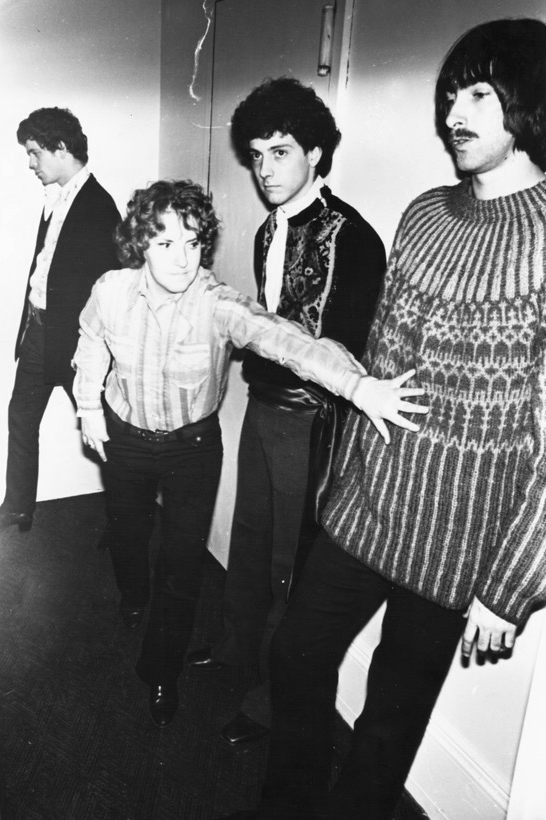|
Post-progressive
Post-progressive is a type of rock music distinguished from vintage progressive rock styles, specifically 1970s prog. Post-progressive draws upon newer developments in popular music and the avant-garde since the mid-1970s. It especially draws from ethnic music and minimalism, elements which were new to rock music. It is different from neo-prog in that the latter pastiches 1970s prog, while "post-progressive" identifies progressive rock music that stems from sources other than prog. Definition "Post-progressive" is rock music which distinguishes itself from the persistent style of 1970s prog, seeking a return to the genre's original principles. The "post" is meant to acknowledge the development of other forms of avant-garde and popular music since the mid 1970s; it does not reference " postmodernism". Purveyors explicitly embrace new computer technologies and sounds. Some post-progressive bands still draw upon selective aspects of vintage prog, even as they actively seek ... [...More Info...] [...Related Items...] OR: [Wikipedia] [Google] [Baidu] |
Progressive Music
Progressive music is music that attempts to expand existing stylistic boundaries associated with specific music genre, genres of music. The word comes from the basic concept of ":wiktionary:progress, progress", which refers to advancements through accumulation, and is often deployed in the context of distinct genres, with progressive rock being the most notable example. Music that is deemed "progressive" usually synthesizes influences from various cultural domains, such as European art music, Celtic folk, Indian music, West Indian, or African music, African. It is rooted in the idea of a cultural alternative, and may also be associated with auteur-stars and concept albums, considered traditional structures of the music industry. As an art theory, the progressive approach falls between formalism (art), formalism and Eclecticism in music, eclecticism. "Formalism" refers to a preoccupation with established external compositional systems, structural unity, and the autonomy of indiv ... [...More Info...] [...Related Items...] OR: [Wikipedia] [Google] [Baidu] |
Progressive Rock
Progressive rock (shortened as prog rock or simply prog) is a broad genre of rock music that primarily developed in the United Kingdom through the mid- to late 1960s, peaking in the early-to-mid-1970s. Initially termed " progressive pop", the style emerged from psychedelic bands who abandoned standard pop or rock traditions in favour of instrumental and compositional techniques more commonly associated with jazz, folk, or classical music, while retaining the instrumentation typical of rock music. Additional elements contributed to its " progressive" label: lyrics were more poetic, technology was harnessed for new sounds, music approached the condition of " art", and the studio, rather than the stage, became the focus of musical activity, which often involved creating music for listening rather than dancing. Progressive rock includes a fusion of styles, approaches and genres, and tends to be diverse and eclectic. Progressive rock is often associated with long solos, exte ... [...More Info...] [...Related Items...] OR: [Wikipedia] [Google] [Baidu] |
King Crimson
King Crimson were an English progressive rock band formed in London in 1968 by Robert Fripp, Michael Giles, Greg Lake, Ian McDonald (musician), Ian McDonald and Peter Sinfield. Guitarist Fripp remained the only constant member throughout the band's long history. The band drew inspiration from a wide variety of music, incorporating elements of classical music, classical, jazz, folk music, folk, heavy metal music, heavy metal, gamelan, blues, industrial (music), industrial, electronic music, electronic, and experimental music. They exerted a strong influence on the early 1970s progressive rock movement, including on contemporaries such as Yes (band), Yes and Genesis (band), Genesis, and continue to inspire subsequent generations of artists across multiple genres. The band has earned a large cult following, especially in the 21st century. The band's debut album, ''In the Court of the Crimson King'' (1969), remains their most commercially successful and influential release. The ne ... [...More Info...] [...Related Items...] OR: [Wikipedia] [Google] [Baidu] |
Neo-prog
Neo-progressive rock (commonly abbreviated neo-prog) is a subgenre of progressive rock that developed in the UK in the early 1980s. The genre's most popular band, Marillion, achieved mainstream success in the decade. Several bands from the genre have continued to record and tour. Characteristics Neo-prog is characterised by deeply emotional content, often delivered via dramatic lyrics and a generous use of imagery and theatricality on-stage. The music is mostly the product of careful composition, relying less heavily on improvised jamming. The subgenre relies very much on clean, melodic and emotional electric guitar solos, combined with keyboards. The main musical influences on the neo-prog genre are bands from the first wave of progressive rock such as early Genesis, Camel, and to a lesser extent Van der Graaf Generator and Pink Floyd. Funk, hard rock and punk rock were also influences on the genre. History In the book ''The Progressive Rock Files'', author Jerr ... [...More Info...] [...Related Items...] OR: [Wikipedia] [Google] [Baidu] |
Art Rock
Art rock is a subgenre of rock music that generally reflects a challenging or avant-garde approach to rock, or which makes use of modernist, experimental, or unconventional elements. Art rock aspires to elevate rock from entertainment to an artistic statement, opting for a more experimental and conceptual outlook on music. Biography"]. Stephen Thomas Erlewine. Allmusic. Accessed 12 February 2020. Yes (band), Yes, Genesis (band), Genesis, Jethro Tull (band), Jethro Tull and Emerson, Lake & Palmer. Journalist Roy Trakin said in 1981: "Of course, these stalwarts can still fill Madison Square Garden and sell a great many records, as they always have, but their days of adventurous risk-taking and musical innovation are long gone – replaced by the smug satisfaction of commercial success." In the early 1980s, the art rock genre influenced the emerging post-punk and new wave movements, as bands incorporated experimental and avant-garde elements that were hallmarks of art rock. Groups ... [...More Info...] [...Related Items...] OR: [Wikipedia] [Google] [Baidu] |
Robert Fripp
Robert Fripp (born 16 May 1946) is an English musician, composer, record producer, and author, best known as the guitarist, founder and longest-lasting member of the progressive rock band King Crimson. He has worked extensively as a session musician and collaborator, notably with David Bowie, Blondie (band), Blondie, Brian Eno, Peter Gabriel, Daryl Hall, the Roches, Talking Heads, and David Sylvian. He also composed the startup sound of Windows Vista, in collaboration with Tucker Martine and Steve Ball. Robert Fripp discography, His discography includes contributions to more than 700 official releases. His compositions often feature unusual asymmetric rhythms, influenced by classical and folk traditions. His innovations include a tape loop, tape delay system known as "Frippertronics" (superseded in the 1990s by a more sophisticated digital system called "Soundscapes") and New standard tuning, New Standard Tuning. Matthew Schnipper of ''Pitchfork (website), Pitchfork'' likened ... [...More Info...] [...Related Items...] OR: [Wikipedia] [Google] [Baidu] |
Avant-rock
Experimental rock, also called avant-rock, is a subgenre of rock music that pushes the boundaries of common composition and performance technique or which experiments with the basic elements of the genre. Artists aim to liberate and innovate, with some of the genre's distinguishing characteristics being improvisational performances, avant-garde influences, odd instrumentation, opaque lyrics (or instrumentals), unorthodox structures and rhythms, and an underlying rejection of commercial aspirations. From its inception, rock music was experimental, but it was not until the late 1960s that rock artists began creating extended and complex compositions through advancements in multitrack recording. In 1967, the genre was as commercially viable as pop music, but by 1970, most of its leading players had incapacitated themselves in some form. In Germany, the krautrock subgenre merged elements of improvisation and psychedelic rock with electronic music, avant-garde and contemporary classi ... [...More Info...] [...Related Items...] OR: [Wikipedia] [Google] [Baidu] |
Paul Hegarty (musician)
Paul Hegarty (born 12 January 1967) is a professor of French and Francophone studies, an author, experimental musician, and lecturer in aesthetics. Hegarty teaches Philosophy and Visual Culture at University of Nottingham. Contributions Hegarty is best known as the author of ''Noise/Music'', a 2007 noise music history. Bookforum review of Paul Hegarty’s Noise/Music: A History by Nicole Lanctot But has also written books on the subjects of Sound Studies, , , History and |
Pastiche
A pastiche () is a work of visual art, literature, theatre, music, or architecture that imitates the style or character of the work of one or more other artists. Unlike parody, pastiche pays homage to the work it imitates, rather than mocking it. The word is the French borrowing of the Italian noun , which is a pâté or pie-filling mixed from diverse ingredients. Its first recorded use in this sense was in 1878. Metaphorically, and describe works that are either composed by several authors, or that incorporate stylistic elements of other artists' work. Pastiche is an example of eclecticism in art. Allusion is not pastiche. A literary allusion may refer to another work, but it does not reiterate it. Allusion requires the audience to share in the author's cultural knowledge. Allusion and pastiche are both mechanisms of intertextuality. By art Literature In literary usage, the term denotes a literary technique employing a generally light-hearted tongue-in-cheek imit ... [...More Info...] [...Related Items...] OR: [Wikipedia] [Google] [Baidu] |
Frank Zappa
Frank Vincent Zappa (December 21, 1940 – December 4, 1993) was an American guitarist, composer, and bandleader. In a career spanning more than 30 years, Zappa composed Rock music, rock, Pop music, pop, jazz, jazz fusion, orchestral and ''musique concrète'' works; he additionally produced nearly all the 60-plus albums he released with his band the Mothers of Invention and as a solo artist. His work is characterized by wikt:nonconformity, nonconformity, Musical improvisation, improvisation sound experimentation, Virtuoso, musical virtuosity and satire of American culture. Zappa also directed feature-length films and music videos, and designed album covers. He is considered one of the most innovative and stylistically diverse musicians of his generation. As a mostly self-taught composer and performer, Zappa had diverse musical influences that led him to create music that was sometimes difficult to categorize. While in his teens, he acquired a taste for 20th-century ... [...More Info...] [...Related Items...] OR: [Wikipedia] [Google] [Baidu] |
Postmodernism
Postmodernism encompasses a variety of artistic, Culture, cultural, and philosophical movements that claim to mark a break from modernism. They have in common the conviction that it is no longer possible to rely upon previous ways of depicting the world. Still, there is disagreement among experts about its more precise meaning even within narrow contexts. The term began to acquire its current range of meanings in literary criticism and architectural theory during the 1950s–1960s. In opposition to modernism's alleged self-seriousness, postmodernism is characterized by its playful use of Eclecticism, eclectic styles and performative irony, among other features. Critics claim it supplants Morality, moral, Politics, political, and Aesthetics, aesthetic ideals with mere style and spectacle. In the 1990s, "postmodernism" came to denote a general – and, in general, celebratory – response to cultural pluralism. Proponents align themselves with feminism, multiculturalism, and pos ... [...More Info...] [...Related Items...] OR: [Wikipedia] [Google] [Baidu] |







